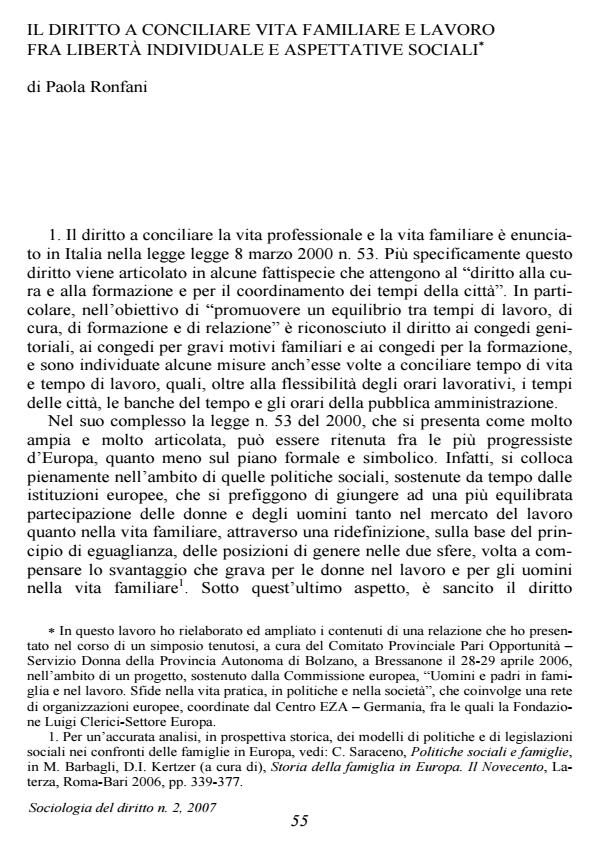Il diritto a conciliare vita familiare e lavoro fra libertà individuale e aspettative sociali
Titolo Rivista SOCIOLOGIA DEL DIRITTO
Autori/Curatori Paola Ronfani
Anno di pubblicazione 2007 Fascicolo 2007/2
Lingua Italiano Numero pagine 15 P. 55-69 Dimensione file 69 KB
DOI
Il DOI è il codice a barre della proprietà intellettuale: per saperne di più
clicca qui
Qui sotto puoi vedere in anteprima la prima pagina di questo articolo.
Se questo articolo ti interessa, lo puoi acquistare (e scaricare in formato pdf) seguendo le facili indicazioni per acquistare il download credit. Acquista Download Credits per scaricare questo Articolo in formato PDF

FrancoAngeli è membro della Publishers International Linking Association, Inc (PILA), associazione indipendente e non profit per facilitare (attraverso i servizi tecnologici implementati da CrossRef.org) l’accesso degli studiosi ai contenuti digitali nelle pubblicazioni professionali e scientifiche.
The Right to Reconcile Family Life and Work: A Case Study of How Individual Freedom Relates to Social Expectations ABSTRACT: In Italy, the right to reconcile one’s professional life with one’s family life was declared in 2000, in a very sweeping and detailed law (N° 53) that comes under the heading of the social policies sustained for some time by the European institutions, whose aim is to enact a series of measures, including paternity leave, to achieve a better balanced participation of women and men, both in the working world and in the activities involved in caring for the family. As it is cited in European document mission statements in particular, the right of reconciliation is dual in nature: it is both a social right and an individual right of freedom, as its application ought to enable women and men to live out their personal relationships in both their public and their private lives. Moreover, insofar as it concerns the relations between social caregivers and social beneficiaries (between parents and their children, for example, but also the older or disabled members of the family), it can also be included under the heading of rights of relationship. The article underscores the almost magical nature of the right of reconciliation, which aims to cater for a very wide range of very different expectations, highlighting the risk that it may be used to transform social problems into individualised legal problems. Specific attention is then paid to its subjective dimension, as a right in everyday life, when elements of conflict become relevant, as its enactment calls for a rather radical redefinition of gender roles in housework and in caring.
Paola Ronfani, Il diritto a conciliare vita familiare e lavoro fra libertà individuale e aspettative sociali in "SOCIOLOGIA DEL DIRITTO " 2/2007, pp 55-69, DOI: